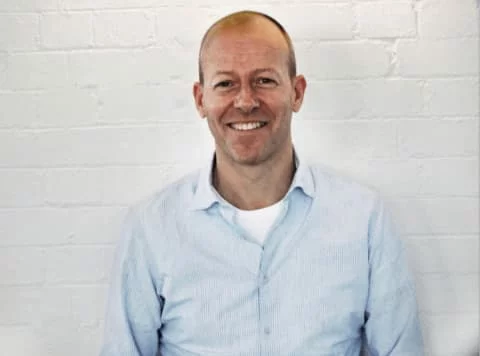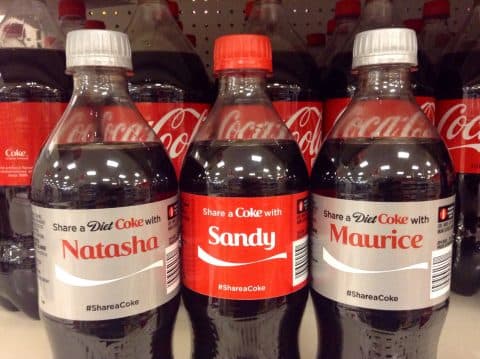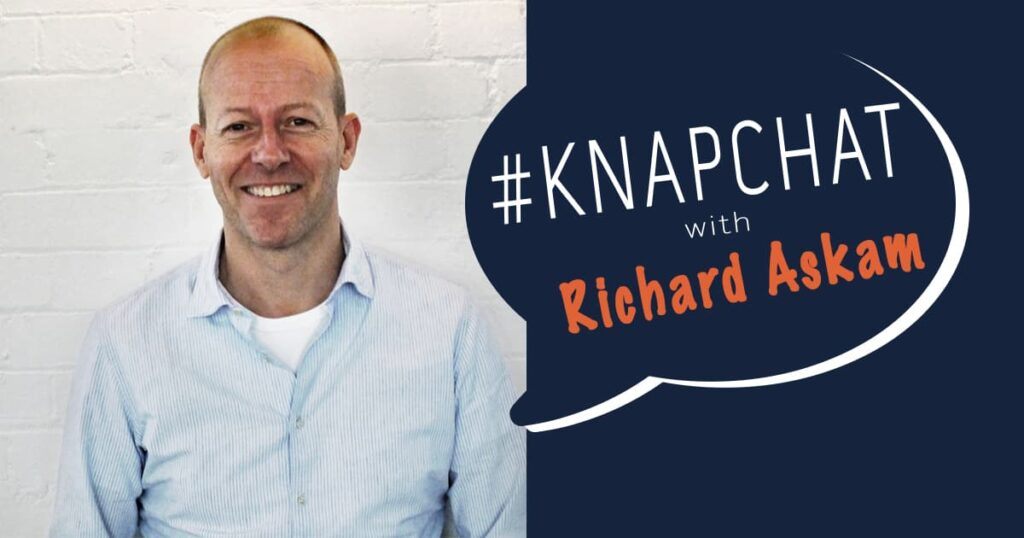From lugging 70kg of wine up a hilly Italian vineyard to spearheading Coca-Cola’s Share a Coke campaign, our latest #KnapChat entry explores how Richard Askam's unique journey has helped him become an expert in building relationships and breaking down barriers between brands and consumers.
Richard Askam has worked with some of the biggest brands in the world, having started a new movement in branding: the rise of personalisation. But such incredible achievements, knowledge and experiences all stemmed from a single idea, one that came to him when he was managing his family's wine business.
KW: How did you come across personalisation in the wine business?
Richard: It was a necessity. The wine and drinks business has been a part of my family’s history since the 1950s but it wasn't really until 1995 that people in the UK started drinking wine for the first time.
Wine gave people the opportunity to give themselves an air of sophistication, and their knowledge of it came from people who knew more, like me, the merchant. I’d point people to what they may like and they’d buy it based on my experience. The irony of that business model is that once you’ve taught people, they don’t need teaching anymore.
In 2006, people came less and less once they knew what they liked and my business was tapering. A year later during the Christmas period, one customer came along and said: "This is boring, I want something different. What can I do to stand out from the ordinary gifts?" I suggested we take the label off a bottle and replace it with the recipient's name. He found that very interesting.
At that moment, personalised alcohol gifts were born and I set about selling that notion to every online retailer. From a standing start in 2010, we sold £1m worth of personalised champagne to Moonpig just like that. That brought us to the attention of Coca-Cola and is now the reason I can float around the world telling my story.

KW: How did you nurture such a strong relationship with your customers that they were open to approaching you with such a question, as opposed to simply looking elsewhere?
Richard: My customers trusted and valued the knowledge we were imparting to them, so why would they go anywhere else? Most businesses should be challenged by their customers to do better. The default for most businesses is “oh they’ve placed another order, brilliant we don’t have to do anything about them” rather than “I see you’ve placed an order, why don’t you try doing this?”
Reaching out might spawn something totally new, as opposed to simply sending an invoice and waiting for that customer to move elsewhere. The innovative circle of any business should be continuous. If there’s ever a day when you think you’re all set, you’re screwed. You just don’t know it yet.
KW: So outside of the industries in which people require that expert guidance, how do brands build trust with their customers?
Richard: It depends whether there’s any romantic notion attached to the knowledge of the product set. Do you, for example, need to know the precise workings of a train’s engine when buying a ticket to London? Or do you just need to know you’re going to get there on time? The depth of knowledge is entirely up to the consumer, but it’s up to the brand to provide it.
At any level, whichever question you ask, businesses should be able to answer it in a way in which you feel interested. It could be as simple as “I need to buy some chocolate biscuits, will you sell me them?” Or it could be “What percentage of cocoa is in this chocolate biscuit?” If you reply saying “I don’t know”, then the relationship breaks down. If you reply saying “It’s funny you should ask that as I wondered myself. It’s actually 33%, which makes them healthier than that brand.” The feeling of such knowledge is as valuable as the knowledge itself.
That’s where most businesses overlook the power of relationships and the lost art of conversation. That 30 seconds you spend with somebody could be the reason they come back for 30 years. Businesses need to see the likes of social media as an enhancement, not a replacement.
KW: What can brands be doing better in terms of personalisation?
Richard: They need to see it as more than just a way of putting people’s name on something. Your name is the least personal thing about you; everyone knows it or can find it out. The value of personalisation is in the thought, not the product. The product is just the delivery method.
If I gave you a gift that said ‘Courchevel 2016”, whether it’s on a biscuit box, mug or bar of chocolate, you’ll remember that holiday we went on. It’s the product that connects the brand with you as the recipient and I as the buyer, but to create that intimacy, you need to deploy something that spurs a memory or emotion.
90% of the bottles of Coke we sold were never opened. Why? Because they weren’t bought to be drunk; they were bought to deliver a memory. Businesses tend to overlook the necessity and go straight for the function. These personalised bottles are assets, not products. I’ve still got one sitting on my desk with my name on it because it’s a memory and keepsake of that campaign.
This sort of thing has actually existed for years in the form of greeting cards. But printing on paper is old now, whereas printing on stuff is relatively new. Personalisation is about taking the messages that work so well in greetings cards and putting them on a product you want to keep, not a piece of paper you throw away or keep in a drawer.
KW: So what’s the next step for personalisation?
Richard: For businesses to allow us more freedom. To trust us not to diminish their brand with silly messages and enable us to prove how clever we are. The biggest movement of trust we’ve seen in our lifetime was when Coca-Cola took their logo off their bottles and replaced it with your name. Other brands can do that, but they daren’t do so.
Another example of this type of bravery would be when French Connection changed their logo to fcuk. There was a lovely connotation that everybody knew but nobody said and that helped them explode as a business. Brands need to think about what they need to do to get noticed, stay noticed and keep getting noticed. The last bit is the hardest.
KW: Coca-Cola is a hugely recognisable brand. How can smaller businesses echo their success?
Richard: That was the beauty in the Coca-Cola campaign: everyone recognises the iconic outline of the bottle. There are a number of iconic brands where the ID almost supersedes the company in our minds as consumers. It’s how you become those that’s the hard bit.
The likes of Amazon, Netflix, Facebook and Google have achieved this despite not existing 10-15 years ago. How have they become such prominent parts of our world? By allowing us to become the executor of the technology.

KW: Personalising something can be an important building block in a relationship, but is there a point in which it goes too far?
Richard: It boils down to taste and decency and the protection of the brand. When we supplied Moonpig, they let their customers get away with anything, and we saw some outrageous things on the photo upload products.
In most cases, you can and should put prevention processes in place to stop those products from getting out the door and being on the front page of the Daily Mail the next morning. It might add a layer of cost, but that small cost saves you a huge amount in terms of avoiding bad publicity.
KW: Are you fearful that the Cambridge Analytica scandal and people’s growing concerns about sharing data will affect personalisation?
Richard: I’m not. This is simply a natural filter for those who are already dubious or slightly sceptical. I have friends who will never bank online due to being scared of having their information stolen, but are happy to walk down the street with a wad of cash to drop off at the bank.
There are enough people in the world to generate a market for personalised products. Those that don’t trust it, will never purchase anyway. They’re the people stood at the bar who don’t know a band is on. These people are not listening.
KW: In your TedX Talks, you spoke about knowing what the future holds. So, where do you believe marketing and the digital world is heading?
Richard: Further forward than it is now, but I’ve no idea in which direction. The business cycle is evolving quicker than ever before due to the pace of the ‘What next?’ culture. Historically, the business cycle has been 30 years; now it’s closer to 30 minutes thanks to the speed of adaptation to technology.
Everyone is looking for the next new thing. Mr Spiegel made a huge amount of money out of Snapchat, for instance, but has been unable to make any more money from the business. That’s because nobody is taking the time to get used to stuff or learn the best ways to use it.
KW: So how do businesses like Snapchat prevent people from looking for what’s next?
Richard: They can’t. The explosion of new technologies seems to be burning faster and brighter than ever before, but not longer. The new world allows people to feel very clever but only for a short amount of time; it's no longer about longevity.
KW: Snapchat’s growth was arguably stunted by the arrival of Instagram Stories. Is that down to people just wanting something new?
Richard: New doesn’t have to be different, it just has to be new. There are very few things in this world that are both new and different. First stage adopters are in the minority but they make all the noise. The next stage adopters listen and begin to recognise the benefits of the product and at the end of that curve are those who only change when their stuff becomes defunct.
The maxim I use when speaking is: “Just because you can, doesn’t mean you should.” There are many products and campaigns that can be done, but that doesn’t mean they should be. For example, Harley Davidson recently released an electric motorbike. This is wrong on so many levels as the reason you buy a Harley is to smell the fuel coming through the engine, and the sound.
KW: So how do you decide whether something ‘should be done’?
Richard: Risk. It’s the four-letter word that people don’t talk about enough in business. There are so many things that have to go right but only one thing can ruin an idea.
I’ve seen some products in the personalisation world that were great ideas but badly executed. Marmite, for instance, did not consider that people would buy their personalised jars for devilment, which is ironic given that their entire campaign is run on the idea that people either love it or hate it.
Marmite disregarded the haters as potential consumers and their production limit was breached so quickly they could not respond to it, therefore missing a massive opportunity. They’ve repeated the campaign several times since but it’s never gone as well because people are now looking for the next new thing.
Another example would be a similar project we did with Jaffa Cakes, which was a great product but nobody really knows about because they spent no money on marketing. You could be selling the best thing in the world but if you don’t tell people, how do you expect them to buy it?
KW: What were the key differences between the Marmite's personalisation campaign and Coca-Cola’s?
Richard: Coca-Cola never saw it as a potential source of revenue, they saw it totally as a brand engagement piece.
The people at Coca-Cola saw a statistic that 50% of the current crop of teenagers were not drinking carbonated soft drinks, meaning a large proportion of potential customers were moving away. They needed a way of encouraging them not to. The notion of putting your name on a bottle of Coke was to say: "Hello teenager! Remember us?" That's what personalisation is all about: starting conversations.
KW: Is this shorter business cycle set to accelerate?
Richard: In the short-term, yes. I heard a reporter at The International Consumer Electronics Show in Vegas ask: “Is there anything here that we actually need or is it just stuff we can have?” And there’s a huge difference between the two.
For instance, the average time for people getting a new phone used to be two years, it’s now three. That has a ripple effect all the way up the mobile phone industry; you as a generation are giving brands like Apple pause for thought as their business has moved 50% the wrong way just like that.
Your behaviour and the ripple of that will determine what comes next. The tail is wagging the dog, which makes a nice change.
Final Words
Trust your customers. Listen to what they have to say. Be brave. Offer something new. Recognise the power of relationships. Make the most of the art of conversation. Offer value in your thoughts. Get noticed. Stay noticed. There are many takeaways from our conversation with Richard Askam, but the most important lesson is actually one he learned during a trip to Australia as a young adult.
"Australians were trying to turn the swampy northern territories into a tourist destination. I remember seeing the television advert, which had the strapline, 'You'll Never Never Know, If You Never Never Go.'
"In the last 5 years, I've put myself in more situations in both my personal and professional life on the basis of that strapline than I did in the previous 47. And the results have been spectacular."
Richard is continuing to innovate in the world of personalisation and is now a key figure in Ballpix, producers of the world's only 48-hour photo-personalised footballs. He also travels the world telling his story and sharing his insights as a professional speaker, writer and broadcaster.
Enjoyed this #KnapChat? There’s plenty more where that came from! Download our FREE eBook to discover the 10 things we’ve learned about building relationships from speaking to our inspirational KnapChatters.
You can also explore some of our recent interviews below...
Intellectual Property Lawyer John Coldham on Building Brand Value and Trust
Ann-Marie Gilbert on Finding Motivation & Inspiration in a Digital World
Comedian Ian Smith Talks Stand-Up, Podcasts & YouTube
Oliver Wilkinson
Content Manager




